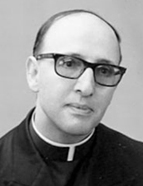

He moved to the Casa dos Escritores da Companhia de Jesus [House of Writers of the Society of Jesus], the journal's headquarters building, while also teaching Theology on the Curso Superior de Religião para Religiosas [Higher Education Course for Religious Women] and the Religious and Spiritual Direction of religious and lay people (Idem, pp. 41-65).
In 1957, on the recommendation of Marcelo Caetano, Chancellor of the University of Lisbon, he was invited by Professor Vitorino Nemésio to teach at the Faculdade de Letras de Lisboa [Faculty of Arts of Lisbon], which he initiated as second assistant in January 1958 and embraced until the end of his life, alongside his priestly life (e.g., spiritual direction, etc.). The high scientific level coupled with the students' satisfaction led the new director of the Faculdade, Orlando Ribeiro, to propose hiring Manuel Antunes as a permanent member of the teaching staff in August 1959, however, this recommendation was not met with equal enthusiasm and did not come to be. Shortly thereafter, in correspondence with his friends Mécia and Jorge de Sena, the priest confessed his difficulty in keeping up with university life and, above all, his inability to continue his research. This latter factor eventually led him to submit his resignation, which was turned down by the intervention of Marcelo Caetano himself. Around 1959, as written to Jorge de Sena and later confessed to Manuel do Carmo Ferreira, he considered writing an unprecedented doctoral thesis entitled “Mística e Filosofia em Plotino” ["Mysticism and Philosophy in Plotinus"], for which he had completed all the readings. Another moment of uncertainty emerged in 1978 when there was an inquiry into the fact that he was not in possession of an official academic qualification, despite, as recalled by one of those consulted in this process, having "the entire background of the Society of Jesus, from Classical Humanities to Theology and Philosophy". (Um pedagogo…,[A pedagogue…] 2011, p. 180). Notwithstanding these setbacks, university teaching was his main occupation, and he was responsible for the chair of História da Cultura Clássica [History of Classical Culture], an interdisciplinary first-year subject for almost all the courses of the Faculdade de Letras, which was later re-named Introdução à Cultura Clássica [Introduction to Classical Culture]. In 1978, he moved to the Philosophy Department. In general, among other subjects, he taught seminars and open courses, História da Civilização Romana [History of Roman Civilisation], História da Filosofia Antiga [History of Ancient Philosophy], Platão I and II [Plato I and II], Aristotle, Ontologia [Ontology], and Pensamento Filosófico em Portugal no Século XX [Philosophical Thinking in Portugal in the 20th Century]. (Idem, pp. 89-95; Padre Manuel Antunes [Father Manuel Antunes], 1985, pp. 8-9).
